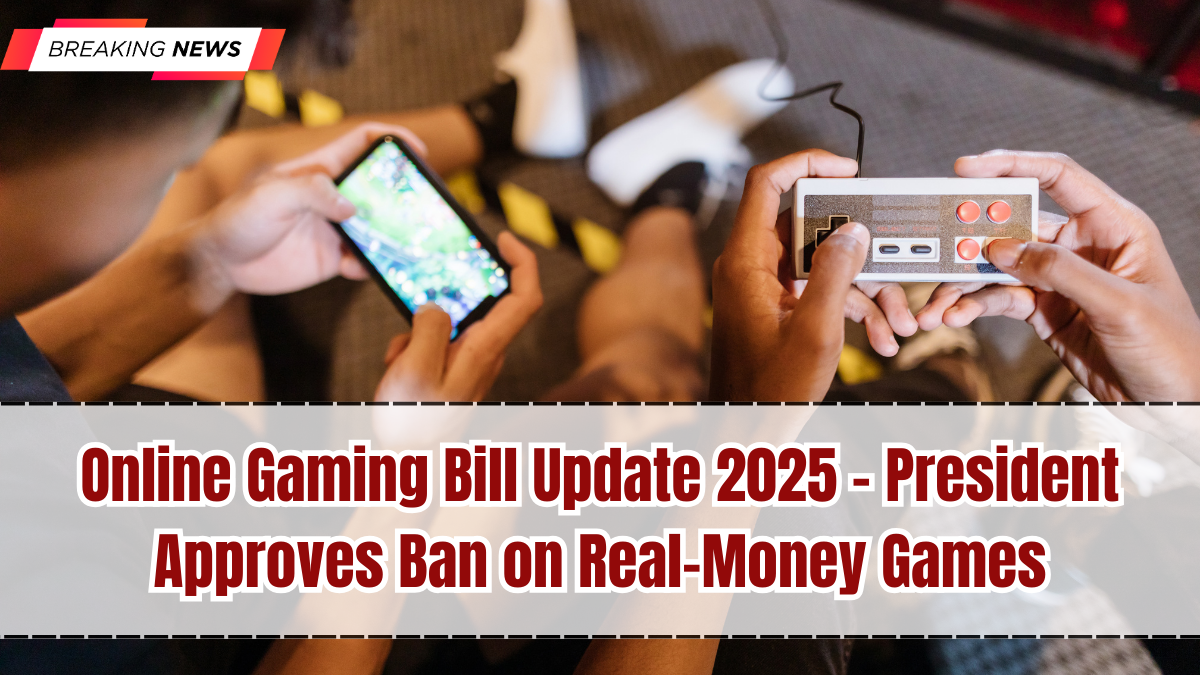India’s booming gaming industry has entered a new chapter with the Online Gaming Bill Update 2025, which received presidential approval this September. The bill introduces sweeping reforms, most notably the ban on real-money online games that involve betting, wagering, or gambling. With millions of players across the country and billions of rupees at stake, this decision is set to reshape the future of gaming in India.
While the government has emphasized that the law aims to protect consumers and curb financial exploitation, the industry is bracing for significant changes. From developers and investors to gamers themselves, the bill’s impact will be felt across multiple levels.

Key Highlights of the Online Gaming Bill 2025
The Online Gaming Bill Update 2025 outlines several important provisions:
-
Ban on Real-Money Games: Games that involve wagering, betting, or gambling with monetary stakes are prohibited.
-
Age Restrictions: Strict age-verification protocols are mandatory for all online gaming platforms to prevent underage access.
-
Licensing for Skill-Based Games: Developers of skill-based games must apply for government licenses to continue operations.
-
Data Protection: Gaming companies are required to store player data within India, ensuring compliance with new digital laws.
-
Advertising Restrictions: Real-money game promotions are banned across TV, OTT, and digital platforms.
These measures position the bill as both a consumer protection law and a digital economy regulator.
Why the Ban Was Introduced
The ban on real-money games stems from rising concerns about addiction, debt, and social harm. Reports highlighted cases of young players losing significant amounts of money through online betting platforms. The Online Gaming Bill Update 2025 addresses these issues by classifying such games under the same legal framework as gambling, which is largely prohibited in India.
Policymakers argue that the regulation not only protects vulnerable users but also helps in distinguishing between harmful betting platforms and legitimate skill-based gaming.
Impact on Gamers
For Indian gamers, the Online Gaming Bill Update 2025 will bring mixed outcomes.
-
Casual players: Can continue enjoying skill-based games like chess, rummy, or esports, provided they are licensed.
-
Real-money players: Will no longer be able to legally access games involving wagers.
-
Youth protection: Stricter age-gates will reduce underage exposure to risky platforms.
The law intends to create a healthier gaming environment, though some players may initially feel restricted.
Impact on Developers and the Industry
For developers and gaming companies, the Online Gaming Bill Update 2025 is both a challenge and an opportunity:
-
Revenue loss: Companies dependent on real-money formats may see sharp declines.
-
Shift to skill-based games: Firms are expected to focus more on esports, educational games, and casual entertainment.
-
Foreign investment concerns: Some international investors may hesitate, while others may pivot toward licensed skill gaming sectors.
-
Compliance costs: Smaller studios may struggle to meet new licensing and data requirements.
Despite the challenges, industry experts believe the regulation could lead to a more sustainable and responsible gaming ecosystem in the long term.
Consumer Protection and Transparency
One of the strongest aspects of the Online Gaming Bill Update 2025 is its emphasis on consumer protection. Platforms will be monitored for transparency, requiring clear disclosure of game mechanics, odds, and risks. Additionally, strict penalties have been introduced for companies violating rules, including heavy fines and possible bans.
These measures aim to build trust among users and establish India as a responsible gaming market aligned with global standards.
Reactions to the Bill
The bill has received mixed reactions. Social activists and parent groups have welcomed it, citing concerns about gambling addiction among youth. On the other hand, industry stakeholders argue that the blanket ban on real-money games could stifle innovation and push players toward unregulated offshore platforms.
However, the government has clarified that a regulatory review will take place annually to assess the effectiveness of the law and make necessary adjustments.
Conclusion
The Online Gaming Bill Update 2025 is a landmark piece of legislation that signals India’s intention to regulate its fast-growing digital entertainment sector. By banning real-money games and enforcing strict compliance for skill-based platforms, the law prioritizes consumer safety and digital accountability. For gamers, developers, and investors, the shift may be challenging, but it also sets the stage for a healthier, more transparent, and sustainable gaming ecosystem in India.
FAQs
What does the Online Gaming Bill 2025 ban?
It bans all real-money online games involving betting, wagering, or gambling.
Are skill-based games still allowed?
Yes, but developers must secure government licenses to operate them legally.
How will age restrictions be enforced?
All platforms must implement strict digital age-verification systems.
What happens to companies violating the rules?
They face heavy fines, suspension, or permanent bans.
Will the law be reviewed in the future?
Yes, the government has committed to annual reviews to evaluate its impact.
Click here to know more.
